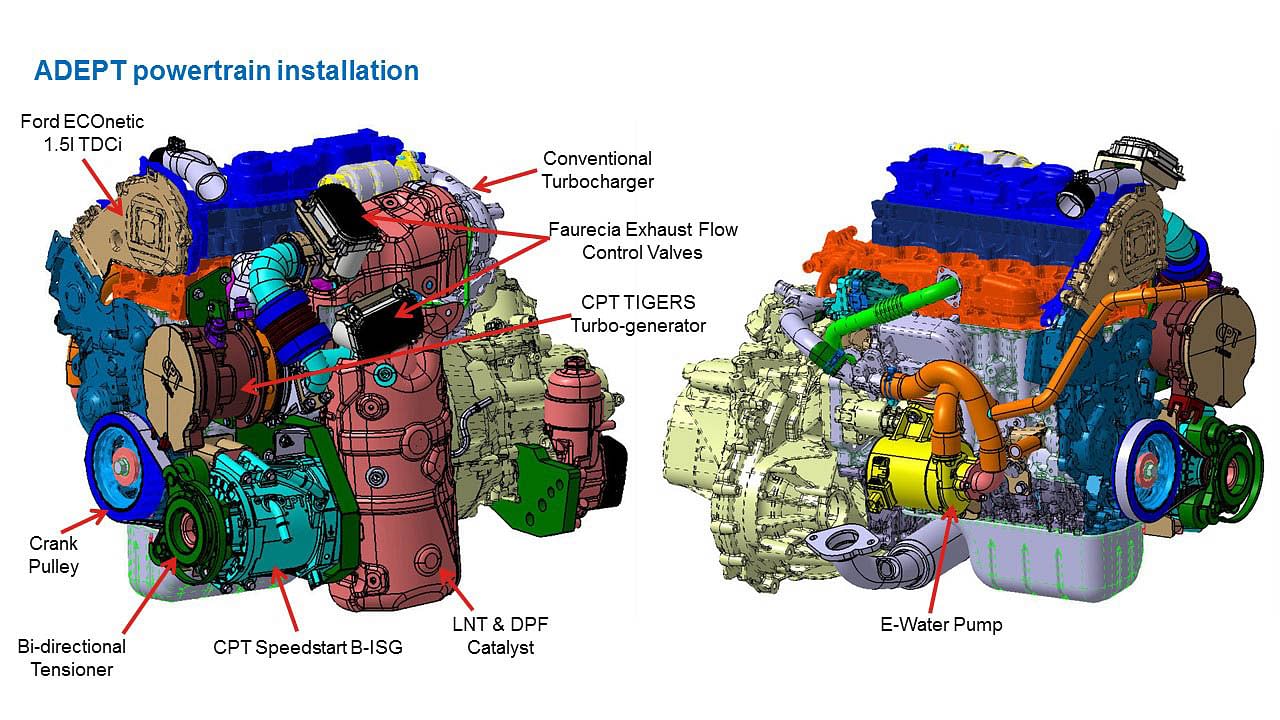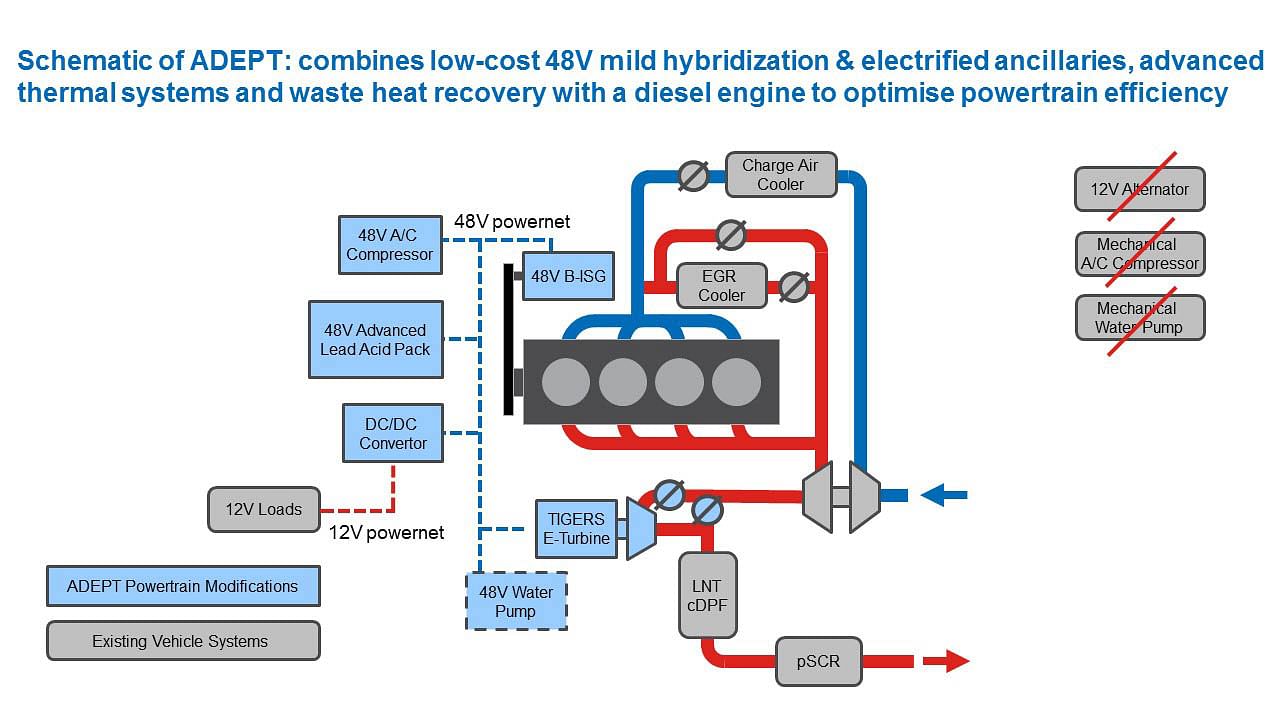Advanced diesel-electric powertrain project in UK cuts fuel consumption by 10-12%
Final testing confirms ADEPT key achievement of 10-12 percent reduction in fuel consumption – equivalent to sub-80g/km of CO2 emissions.
The three-year advanced diesel-electric powertrain (ADEPT) project, led by Ricardo of the UK, has thrown up some surprising results.
The automotive industry the world over is facing the challenge of offering customers new vehicles that are able to deliver significantly improved fuel economy and reduced carbon dioxide emissions, while at the same time maintaining affordability, performance and achieving the latest regulated emissions limits.
The ADEPT project set the target of developing and validating a range of advanced mild hybrid technologies with 48V ‘intelligent electrification’ utilising an advanced lead carbon battery. These have been applied to a Ford Focus project demonstrator.
Key achievements of the ADEPT project have been to show that the integration of hybrid and emissions control systems in the manner envisaged by the project, can deliver a Euro 6b compliant package offering up to a 10-12 percent reduction in fuel consumption, equivalent to sub-80g/km of CO2 emissions (NEDC). It can also offer improved responsiveness and acceleration as a result of the increased full-load powertrain torque available through the hybrid systems. Moreover, according to the latest updated analysis of the potential cost of production implementation of ADEPT – conducted independently by Ricardo – the system would represent an incremental cost of in the region of 60 euros (Rs 4,586) per gram/km of CO2 reduction.


This is a result that makes the ADEPT powertrain architecture very competitive with other fuel economy solutions such as full hybridisation, where costs of implementation can be significantly higher. The ADEPT powertrain concept is also equally applicable – with appropriate fine tuning of design and configuration – to petrol or alternatively fuelled powertrains.
Details of the configuration of the affordable ADEPT hybrid powertrain concept were revealed in late June together with the provisional results of vehicle testing. Today, these very positive results will be confirmed – and in the case of the Ricardo cost estimate for implementation, exceeded – in a presentation at the LCV2016 show, where delegates will be able to experience the performance of the ADEPT vehicle on the test track.
“The confirmation of the impressive results of the ADEPT project is a great achievement for the whole project team,” commented Ricardo Innovations MD Thomas Gutwald. “The concept of ‘intelligent electrification’ as exemplified in the ADEPT project is likely to enjoy mass-market appeal in the short to medium term, due to the fuel economy, performance and cost benefits that it brings. This concept – which is applicable with appropriate adaptation to gasoline, diesel or alternatively fuelled IC engine-based powertrains – is thus a very attractive solution for both the consumer and automaker. It is also a fitting conclusion to the project that we are able to make the ADEPT vehicle available for a public ride and drive for the first time tomorrow at one of Europe’s major showcases for low carbon vehicle technology, LCV2016.”
For consortium partner and switched-reluctance motor-generator technology developer Controlled Power Technologies, 48V electrification is about harvesting and recycling kinetic and thermal energy, explains CPT’s founder and chief executive Nick Pascoe: “Our SpeedStart motor-generator, for example, which replaces the conventional alternator and starter-motor, can near instantaneously boost engine power and torque whenever required without having to feed additional fuel into the engine. So not only can we boost vehicle performance and fuel economy, but we can also improve air quality by reducing NOx and particulate emissions. And while SpeedStart also recovers kinetic energy, our turbine integrated exhaust gas energy recovery system known as TIGERS simultaneously recovers thermal energy. Furthermore, 48V mild hybrid technology is equally applicable to trucks and buses, as well as off-road vehicles.”
Alistair Davidson, of ALABC, added: “The excellent results of the ADEPT project clearly demonstrate that advanced lead-carbon batteries in 48V automotive applications are the most cost efficient way of meeting stringent future CO2 emission targets, when measured by the relevant test procedures for HEV operation.”
A UK government-funded project
The ADEPT project has been led by Ricardo in a research partnership that has included the Advanced Lead Acid Battery Consortium (ALABC), Controlled Power Technologies (CPT), Faurecia Emissions Control Technologies UK Ltd, Ford Motor Company and the University of Nottingham. The research project was jointly funded by the UK government’s Office for Low Emission Vehicles (OLEV) implemented through the UK innovation agency, Innovate UK, with matching contributions from the participants.
You may like: Electric Vehicle sales in UK reach highest ever mark in H1-2016
RELATED ARTICLES
Autoliv Plans JV for Advanced Safety Electronics With China’s HSAE
The new joint venture, which is to be located strategically near Shanghai and close to several existing Autoliv sites in...
JLR to Restart Production Over a Month After September Hacking
Manufacturing operations at the Tata Group-owned British luxury car and SUV manufacturer were shut down following a cybe...
BYD UK Sales Jump 880% in September to 11,271 units
Sales record sets the UK apart as the largest international market for BYD outside of China for the first time. The Seal...






 By Autocar Professional Bureau
By Autocar Professional Bureau
 13 Sep 2016
13 Sep 2016
 4991 Views
4991 Views





 Ajit Dalvi
Ajit Dalvi




